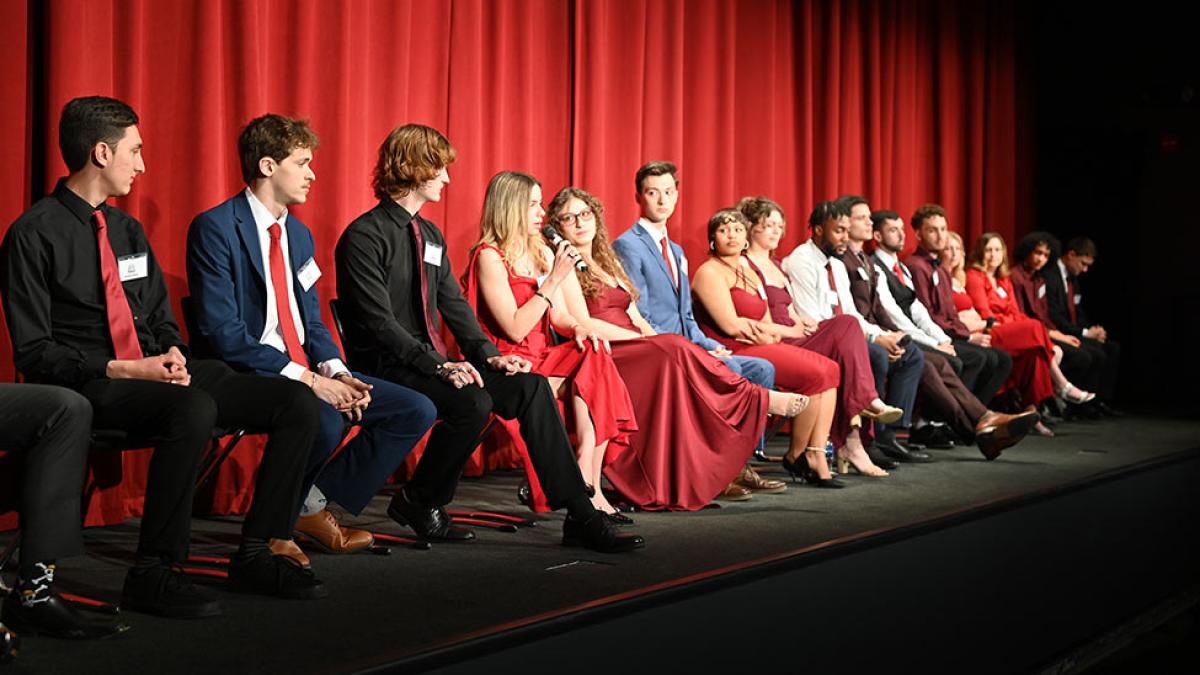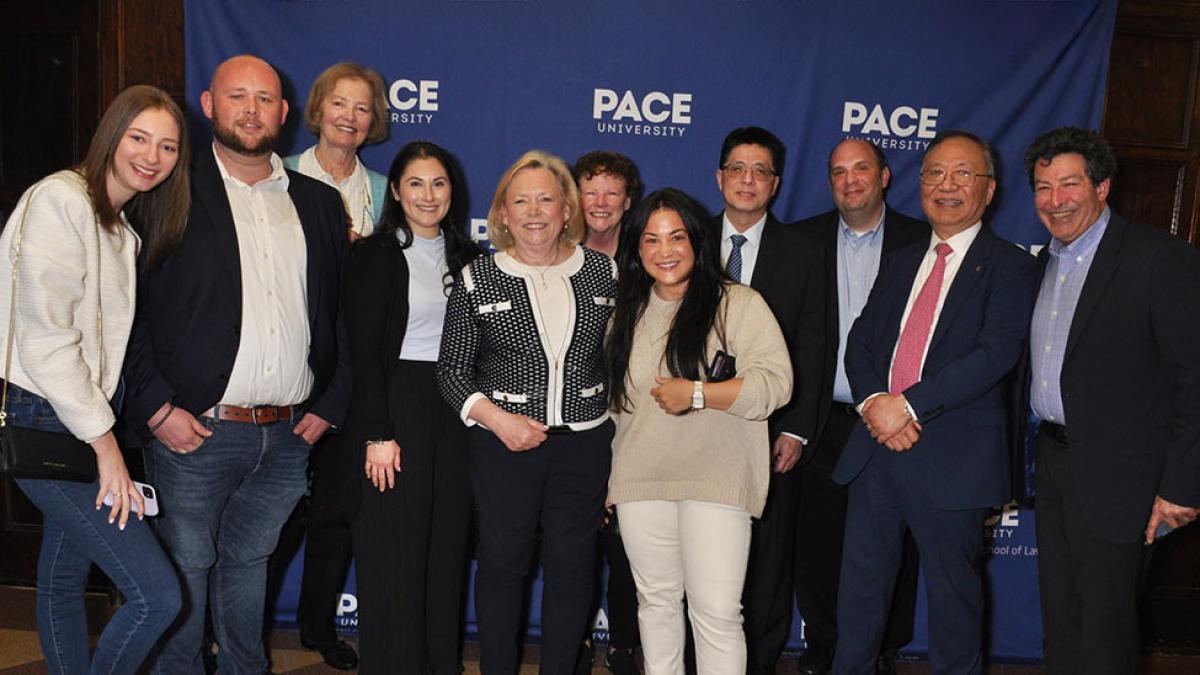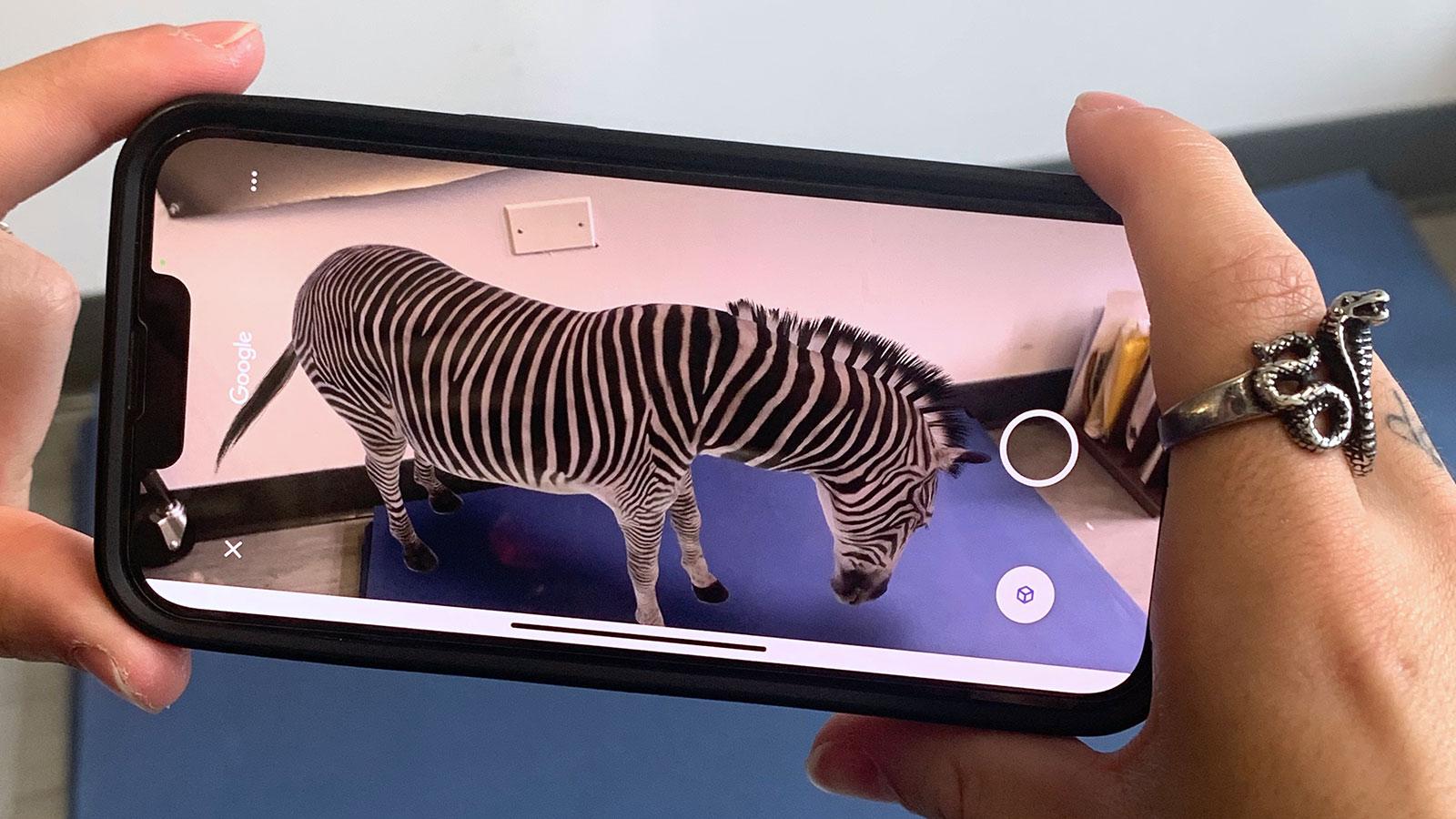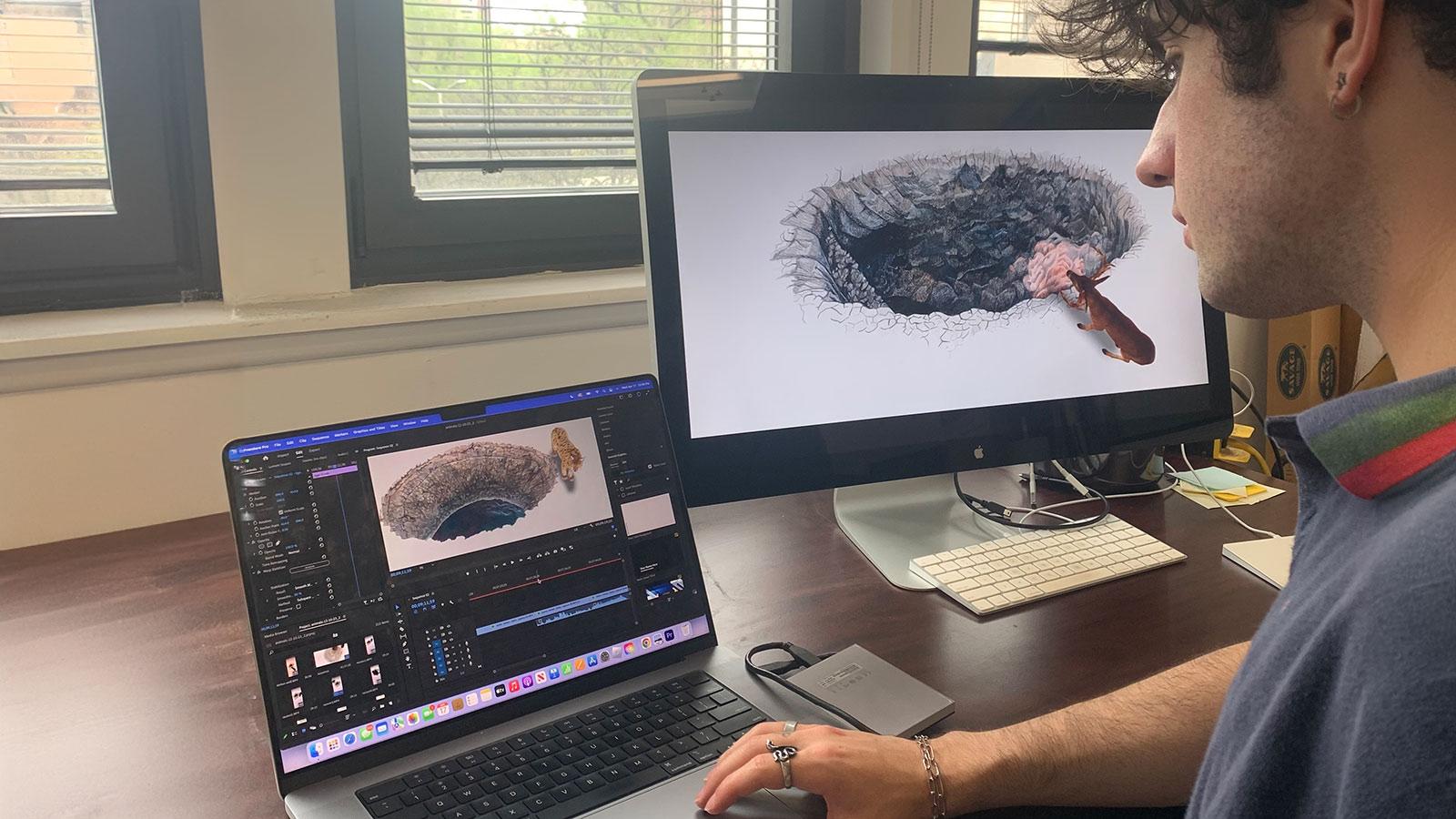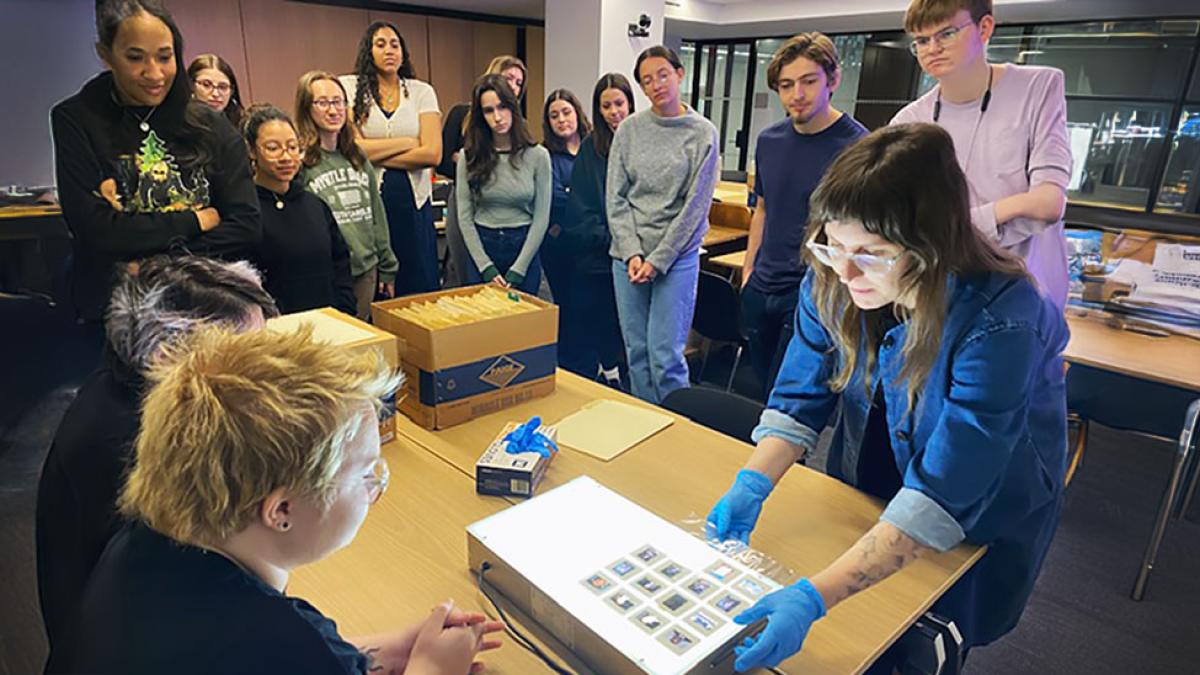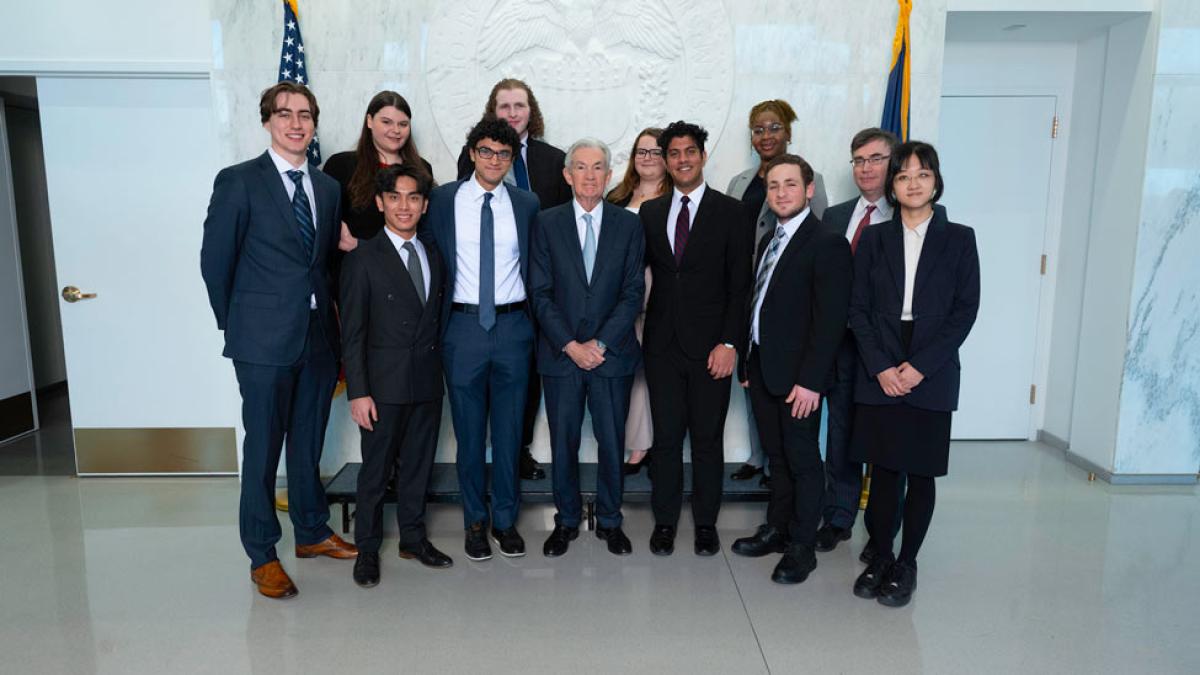
Her Newest Role
Sands College of Performing Arts has a new faculty member, who you may know from her many starring and scene-stealing roles over the years. Meet Professor Kathleen Turner, who shares her passion for teaching in a candid Q+A.

Peggy Sue Got Married. Romancing the Stone. Friends. The Kominsky Method. Serial Mom.

Kathleen Turner’s illustrious career, which includes dozens of notable roles across various genres and two Golden Globe Awards (plus nominations for an Oscar, a Grammy, and two Tony Awards) has made her a household name across generations.
Now, she can add one more item to her CV—Professor at Sands College of Performing Arts.
Having recently joined the faculty at Pace University’s Sands College of Performing Arts, Turner is channeling her decades of high-level performing arts experience into educating the next generation of performers. In a candid discussion, she reflects on her decision to join Pace, emphasizing her belief in the importance of higher education within the performing arts.
What excites you about teaching?
A lot of it is passing it on. I’ve done a lot of work—a good body of work. It’s more than that; it’s about the ethics of it. What do we owe each other? What is the responsibility toward the audience? If you have this kind of ability, this gift of communication, then you really have to be aware of the responsibilities inherent in that, and choose them. Choose what kind of material you represent and do so with great care—this is probably more important than anything.
In your opinion, what makes a great teacher?
I suppose you’d have to start with passion for the subject of what they’re teaching. A real love of it. A real belief in it. Why else do it?
What are some qualities that you see in Pace students today that excites you?
I like the curiosity. I like the fact that they are willing and wanting to learn, to explore, in terms of material and process. The technique of it. I’m not dealing with performers who are already stuck in their ways which would be useless to me. I don’t subscribe to any one method or discipline; I would think that excluding things would be rather short-sighted. I’m pleased with the open-mindedness of the students.
On a technical level, what course(s) will you be teaching?
Pace has allowed me to pretty much design the course, which we’re calling: Stage to Screen. I’m trying to show and teach the choices and the difference in choices that you make for one medium as opposed to another. And also to teach them how to read a film script, how to visualize it.
It’s rather complicated at times, but I've got all seniors in the course, which I like–by the time they come into my class they have a certain level of experience and knowledge to begin with, so we can just take off.
In the course, do you spend any time on the business side of the industry?
Yea. Absolutely. This week, I brought in some very highly qualified agents to talk about their job, what the actor can ask of them, what they will be asked of, it was quite fascinating, the discussion and the questions that the students asked and did not really know before.
This is a business. This ain’t no hobby, honey.
Having now been around the University, what do you think has changed since you were studying to be a performer? What has remained the same?
We had no camera training at all 45 years ago. Nobody had the equipment. At that time, cameras were 500 pounds each. No school had that kind of capacity to handle that kind of thing. Technology has enabled us to do amazing things that were quite impossible in the past.
But I think the core thing that has not changed is doing it. Just doing it as much as possible. I tell students not necessarily to go to a conservatory or school which only emphasizes the craft–the broader the education, in many ways, the more beneficial for the actor. We need to know just about everything. I think again, why close yourself off? Go to a school where you get to work, to get on camera.
These schools that say you’re not allowed to perform for the first two years or whatever, to me are two years of wasted time. Don’t talk about it, do it!
What do you hope students will take away from spending time with you in the classroom?
I want the students who worked and learned with me to go out and to be able to do professional work. To be able to fulfill the actor’s role. Everybody has a learning curve, of course. And experience is always a teacher. But that being said, I don’t want any of my students to go out and let a production down.
If you were starting out today, what advice would you give to your younger self?
What I remember has remained true is to have true confidence in yourself. Don’t walk into an audition, don’t walk into a job, wondering if you can do it. You can do it.
The only responsibility is to be sure that you did the very, very best job that you could do that day. You may wake up in the middle of the night and say “Oh hell, I should’ve made that choice.” That’s okay. At the time, in the place, you made the best choice you could. That’s what you owe. Nothing more.
More from Pace Magazine:
Discover incredible stories that showcase the amazing achievements and initiatives happening at Pace. From top rankings to groundbreaking programs and student journeys, there’s something to inspire everyone.
In a remarkable career that spans over four decades, Barbara Farrell, EdD, CPA, has been an indomitable force in the field of accounting education at Pace University. The Lubin School of Business professor was recently honored with the prestigious Presidential Lifetime Achievement Award, recognizing her unwavering commitment to teaching, service, scholarship, and her significant contributions to the Pace community.
Why do humans speak the way they do? College of Health Professions Associate Professor Sethu Karthikeyan, PhD, is exploring the evolutionary biology behind voice pitch.
Seidenberg Class of 2024 Student Awards
As the Spring 2024 semester came to an end, Seidenberg’s students and their families, faculty, and staff came together on our NYC and Pleasantville campuses to honor the Class of 2024 award winners at the annual Seidenberg School of Computer Science and Information Systems Awards Ceremonies.
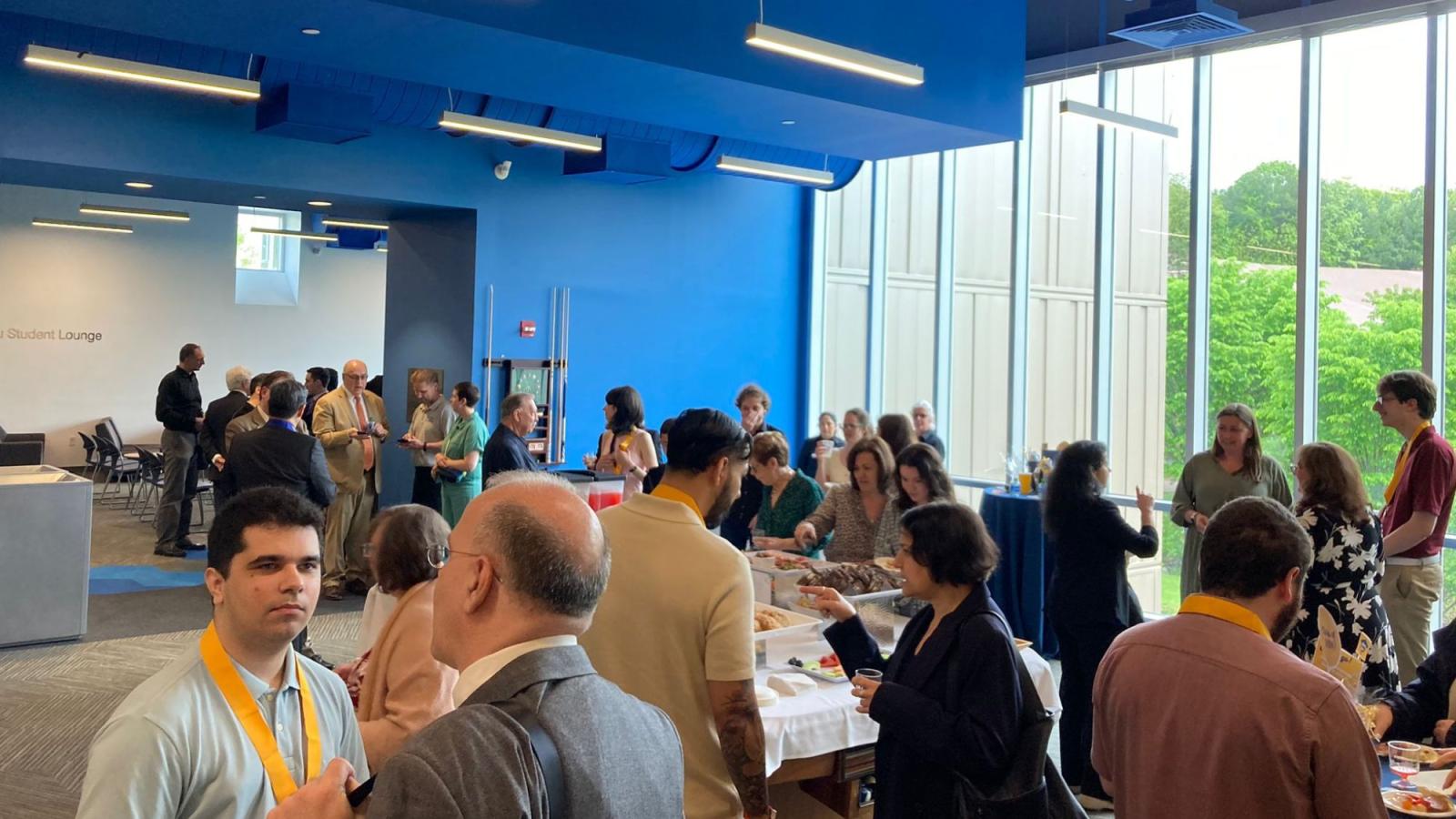
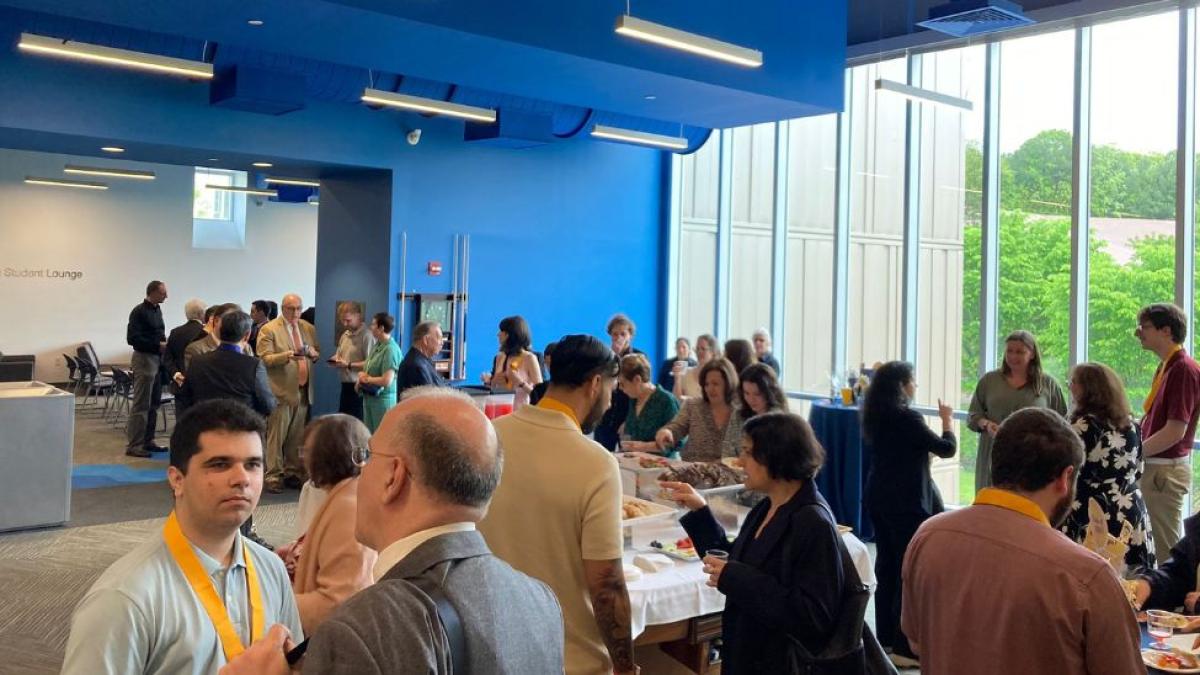
As the Spring 2024 semester came to an end, Seidenberg’s students and their families, faculty, and staff came together on our NYC and Pleasantville campuses to honor the Class of 2024 award winners at the annual Seidenberg School of Computer Science and Information Systems Awards Ceremonies.
View the event photos (Dropbox)
Below is a list of all the Class of 2024 Seidenberg award winners. The whole Seidenberg team congratulates you on these major achievements!
Doctoral Awards (Pleasantville)
- Outstanding Student of the Year: Paxton J. Louis
Graduate Awards (Pleasantville)
- Outstanding Student of the Year: Thomas W. Cookson
- Computer Science Departmental Award: Yuxiang Liu
- Cybersecurity Scholar Award: Justin Brandon, John Michael Mueller
- Information Systems Departmental Award: Sejal Arora
Graduate Awards (NYC)
- Outstanding Student of the Year: Darsh Hiteshkumar Joshi
- Computer Science Departmental Award: Ram Prakash Babu, Shiva Sourav Kasula, Jiatao Kuang, Rahul Anand Nayanegali, Fnu Pariva, Vinay Pusuluri, Prathima Seethalam Radhakrishna, Somil Haresh Saparia, Bansariben Sureshbhai Sorathiya, Swetha Voora
- Cybersecurity Scholar Award: Jash Mayur Ghelani, Amrutha Ginkala, Poojan Sunilkumar Shah
- Data Science Scholar Award: Piyush Gupta, Aishwarya Hiremath, Tirthkumar Mukeshkumar Patel
- Information Systems Departmental Award: Saloni P Bhaiya, Yash A Jivani, Yuraja Sohel Kadari, Guna Sai Koniki, Pratik Shashikant Mane, Alekhya Mudunuri, Dipen M Patel, Linhui Shi
- Telecommunications Award: Nambinachiar Devendran Konar
- Human Centered Design Award: Priyanka P Kadam, Liza Karimova, Susanna P Lammervo, Saumya Roy
- Francis Marchese Software Development and Engineering Award: Egemen Durmus
Undergraduate Awards (Pleasantville)
- Scholastic Achievement Award: Erin Sorbella
- Computer Science Departmental Award: Kenji Okura
- Information Technology Departmental Award: Alexandra Breygina
Undergraduate Awards (NYC)
- Scholastic Achievement Award: Joseph Paradiso
- Computer Science Departmental Award: Christian Concepcion
- Information Technology Departmental Award: Samantha Henry
School Awards (Pleasantville)
- Jean Coppola Award for Excellence in Service-Learning Research: Tyler Ian Besnoff, Andrew James Kirk
- Susan M. Merritt Computing Award for Academic Excellence: Zia E Joseph, Stephanie Ann Sicilian
- Seidenberg Civic Engagement Award: Simone Genesis Gonzalez, Daniel James White
- Alumni Achievement Award: Alexander J Hughes
- Seidenberg Scholars: Simone Genesis Gonzalez, Alexander J Hughes, Matthew Brandon Pollard
- Blue CoLab Innovation Award: Leanna L. Machado, Kenji Okura
- Career Services Award: Tyler Ian Besnoff
School Awards (NYC)
- Jean Coppola Award for Excellence in Service-Learning Research: Sankalp Raut, Kylie A LoPiccolo
- Susan M. Merritt Computing Award for Academic Excellence: Nadia Xu, Lauren DeMaio
- Seidenberg Civic Engagement Award: Oleksandr Sverenyak, Nishant Doshi
- Alumni Achievement Award: Austin Powlette, Evan R Altman
- Seidenberg Scholars: William Milun, Audrey Staub, Oleksandr Sverenyak
- Career Services Award: Daniel Pena, Smith Dsouza
Latin Honors (Pleasantville)
- Summa Cum Laude: Alexandra Breygina, Kenji Okura, Erin Sorbella
- Magna Cum Laude: Tyler Ian Besnoff, Altar Demaj, Alexander J Hughes, Zia E Joseph, Sean Tavares Kahn, Lucas Lecler Maturana, James Michael Maxwell, Domenico Monteleone, Christopher Peter Stissi, Jack R Sullivan, Daniel James White
- Cum Laude: Cristian E Bolanos, Jared Fligor, Ardin Kraja, Jake William-Emmett Sharkey, Zheng Zhou
- With Distinction: Jasmin R Juliano, Andrew James Kirk, George Moses
Latin Honors (NYC)
- Summa Cum Laude: Nicholas R Bono, Christian Concepcion, Samantha Henry, Joseph Paradiso, Oleksandr Sverenyak
- Magna Cum Laude: Shiyang Cai, Lauren V DeMaio, Hyemin Jeon, Kylie A LoPiccolo, Alexander Martinez, Daniel Pena, Austin Powlette, Thomas Shen
- Cum Laude: Kiersten S Bernius, Alexander J Klisouriotis, William I Milun, Brandon P Negron, Andrew Ngo, Joanne Pistulli, Anthony J Testani
- With Distinction: Nora A Broyles
Pace Magazine: Past Digital Issues
Missed an issue of Pace Magazine? Catch up with past issues here.


- Winter 2024 Digital Issue
- Summer 2023 Digital Issue
- Winter 2023 Digital Issue
- Summer 2022 Digital Flipbook | Summer 2022 Digital Issue
- Fall 2021 Digital Issue
- Spring 2021 Digital Issue
- Fall 2020 Digital Flipbook
- Spring 2020 Digital Flipbook
- Fall 2019 Digital Flipbook
- Spring 2019 Digital Flipbook
- Fall 2018 Digital Flipbook
- Spring 2018 Digital Flipbook
- Fall 2017 Digital Flipbook
- Spring 2017 Digital Flipbook
- Fall 2016 Digital Flipbook
- Spring 2016 Digital Flipbook
- Fall 2015 Digital Flipbook
- Spring 2015 Digital Flipbook
- Fall 2014 Digital Flipbook
- Spring 2014 Digital Flipbook
- Fall 2013 Digital Flipbook
Seidenberg Professor Awarded Grant from the National Institute of Health
Seidenberg Associate Professor and recipient of numerous grants for his research of technologies in the medical field, Dr. Zhan Zhang, has just received a new grant from the National Institute of Health (NIH).
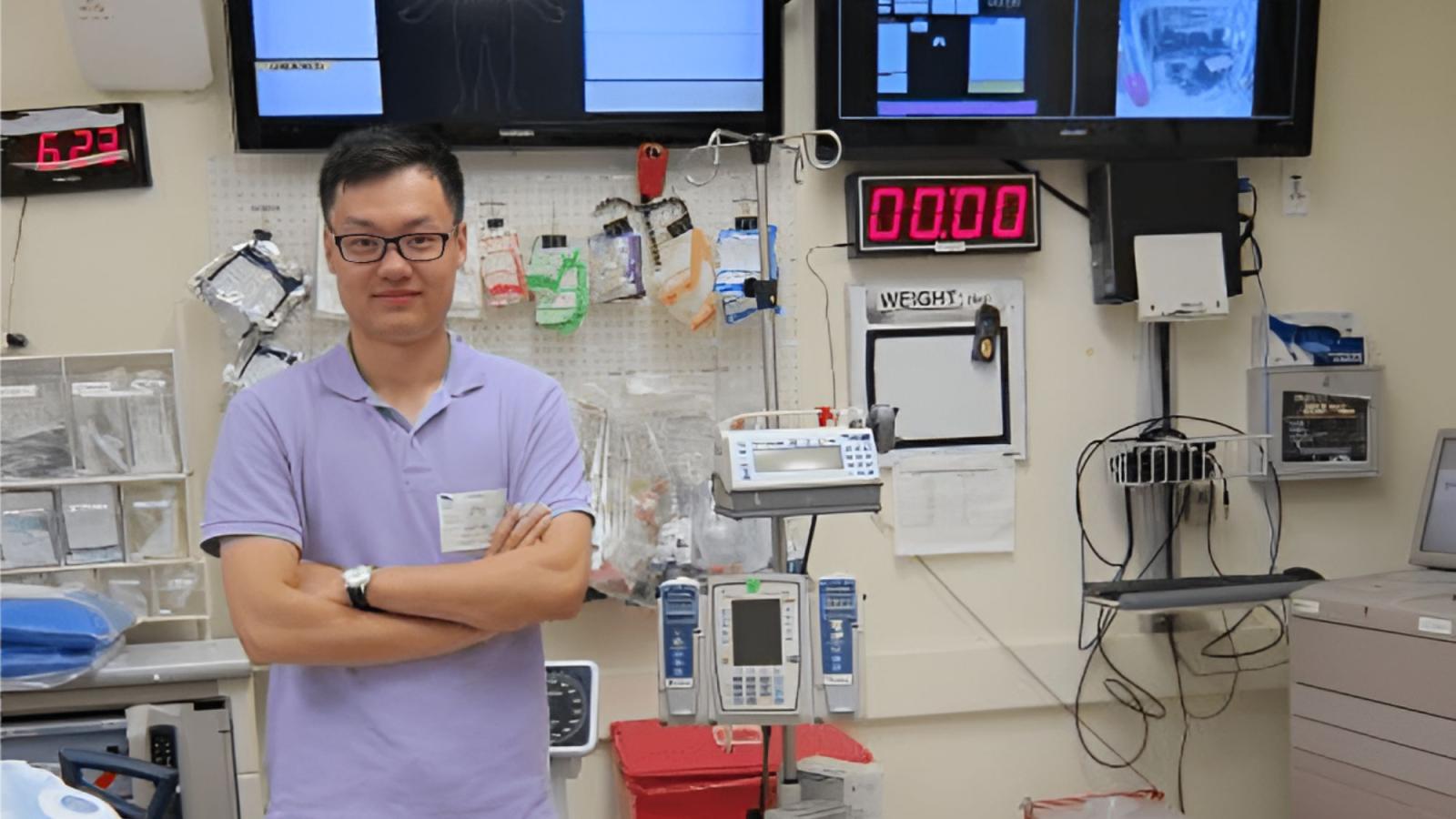
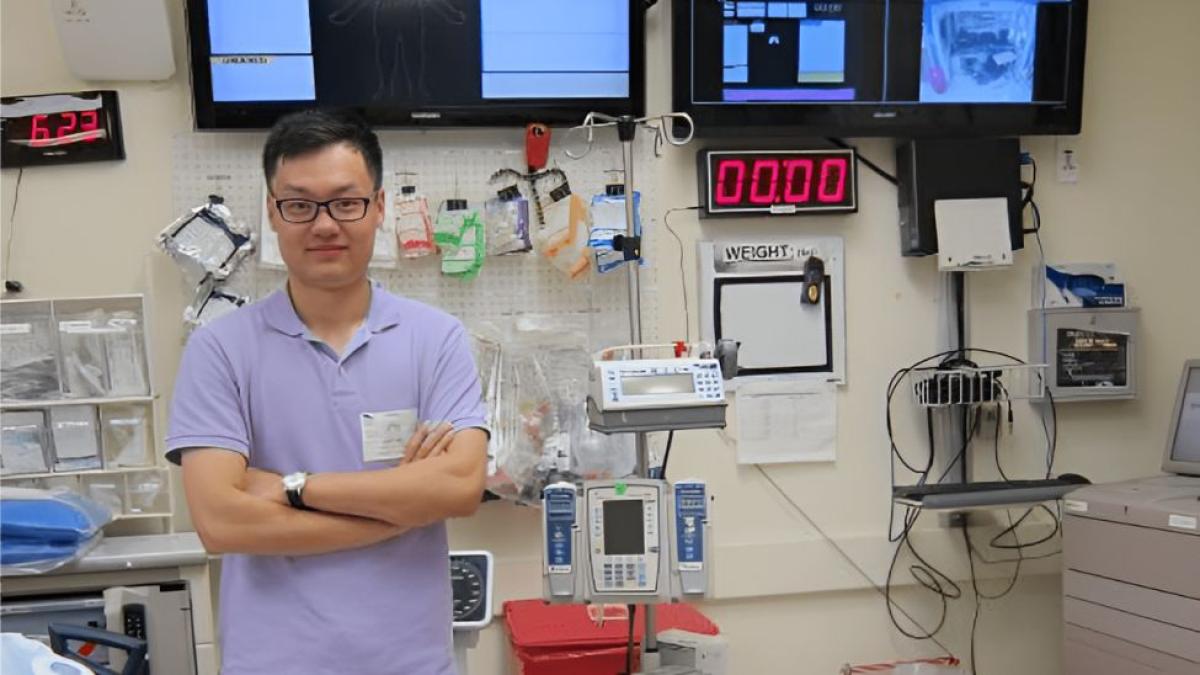
Seidenberg Associate Professor and recipient of numerous grants for his research of technologies in the medical field, Dr. Zhan Zhang, has just received a new grant from the National Institute of Health (NIH).
The new grant is a three-year project with $420,000 in funding, and will focus on developing AI-empowered decision support systems for emergency care services. This grant can support up to four undergraduate students doing research every year.
Dr. Zhang’s newest accomplishment continues his previous successes in research and grant acquisitions in the field of healthcare technology. His work primarily focuses on developing innovative solutions for emergency care personnel, including wearable devices for paramedics and collection of real-time patient data, UX design, and human-computer interactions. Dr. Zhang has previously been awarded multiple grants by the National Science Foundation (NSF), including a prestigious $500,000 award to develop touchless smart glasses for emergency care professionals. He also made history at Pace University with a previous NIH-funded project (research of care coordination and communication between medical teams using smart glasses and advanced interaction mechanisms like augmented reality), by becoming the first professor at Pace to receive grants from both the NSF and NIH.
When talking about his newest NIH grant, Dr. Zhang said that it is “a continuation of my prior work on digitizing EMS work through novel technology. The ultimate goal is to support informed decision-making and reduce medical errors in pre-hospital care.” The aim of the project is to design and develop an evidence-based cognitive aid that can effectively support prehospital providers in treating pediatric patients while considering their dynamic workflow.
The interdisciplinary team will consist of experts in pediatric emergency care, human-computer interaction, natural language processing (NLP), and artificial intelligence (AI). They will focus on three main goals: to characterize medical errors in prehospital pediatric care through a “human-in-the-loop” computational approach, to design and develop user-friendly cognitive aids for prehospital providers, and to implement and evaluate the proposed technology solution in simulated environments. The students who will be recruited to conduct research on the project will also come from various backgrounds to foster collaboration and a diverse learning environment. They will be trained and mentored to develop both technical (e.g., medical informatics, NLP, user-centered design) and non-technical (e.g., communication, teamwork, and critical thinking) skills.
Student/Faculty Collaboration on Creative Works Blossoms with the Amelia A. Gould Assistantship Support
As part of a collaboration funded by the Amelia A. Gould Undergraduate Research Assistantship, Film and Screen Studies student Ben Pfeifer '26 and Art professor Jillian McDonald used 3D animals, AR, and drawings inspired by pandemic musings to create a vivid narrative of climate change and artistic exploration which were projected on the Manhattan Bridge.
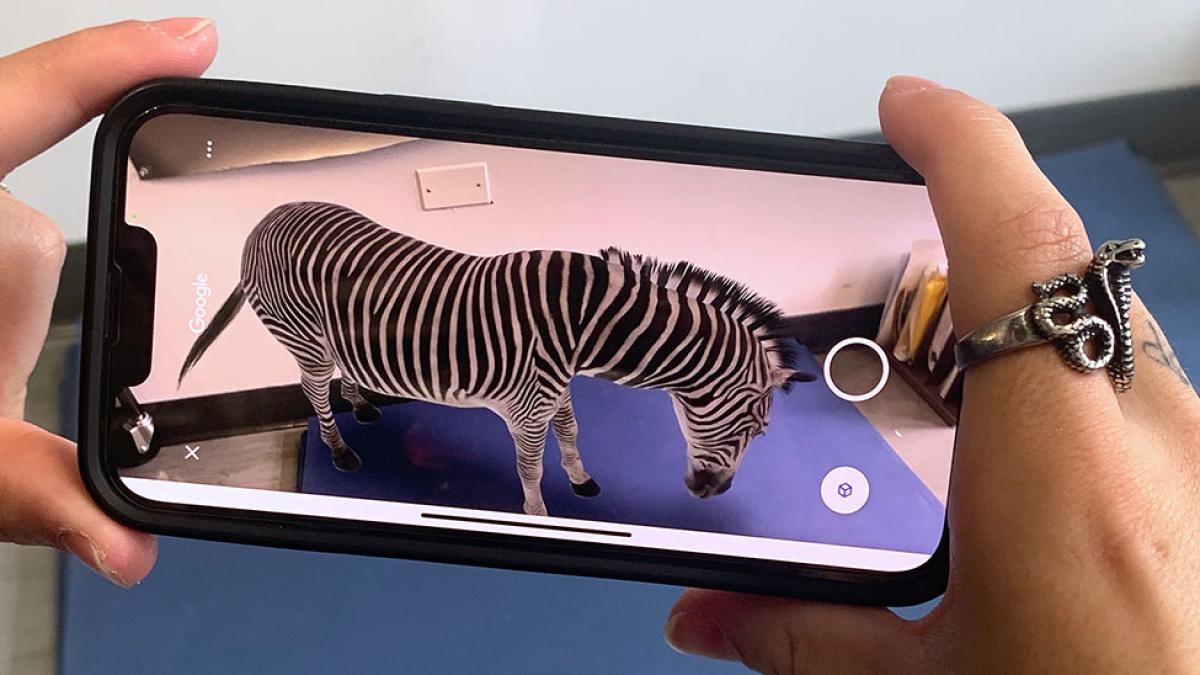
A Pomeranian dog and an octopus, respectively, bark at the edge of or tread water in giant holes in the earth and ice. They seem curious, distressed, or simply oblivious. Next, ruptures on the earth, signals of climate change and collapse, appear as sinkholes, the result of melting permafrost releasing volumes of trapped gas in an explosive crater-forming event.
A glimpse at the Manhattan Bridge, accompanied by loud traffic, provides an actual sense of location.
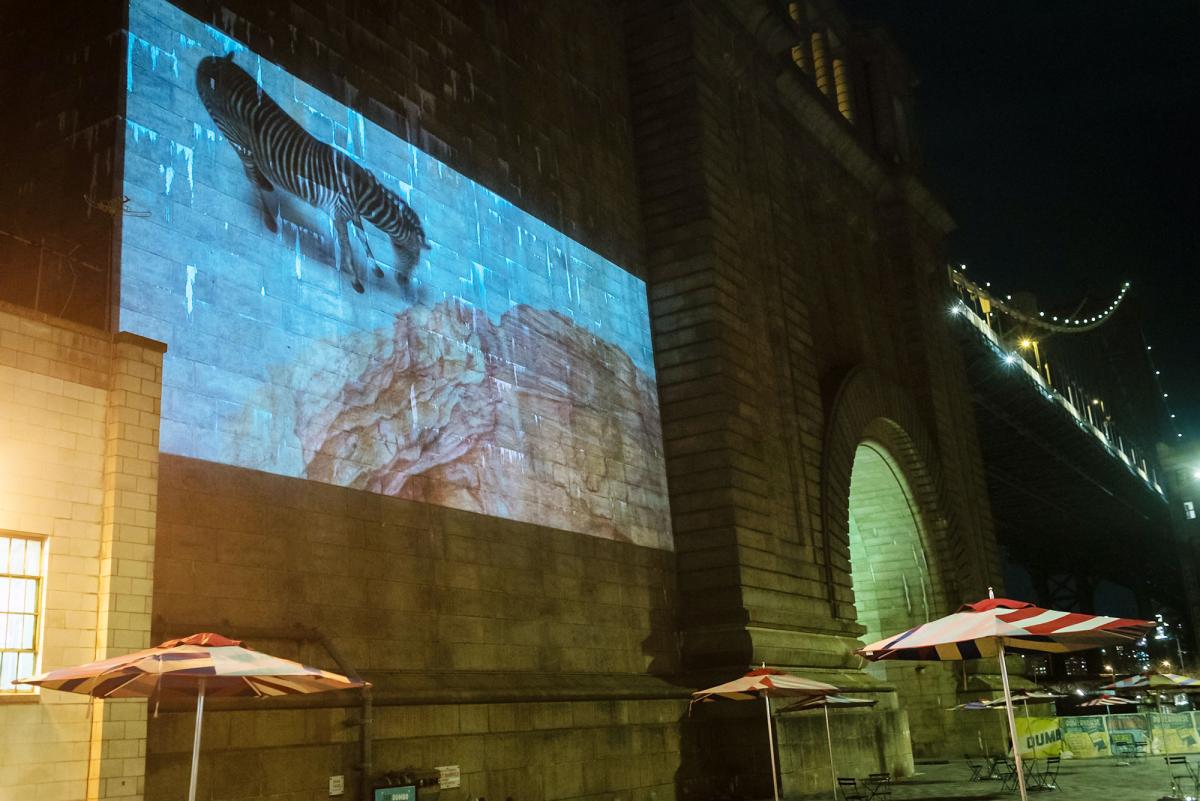
It is DUMBO (an acronym for Down Under the Manhattan Bridge Overpass), Brooklyn, across the river from Pace University's New York City campus, and, as part of an outdoor group exhibition in March and April 2024 entitled The DUMBO Projection Project, Volume 3, Professor of Art Jillian McDonald's work, Animals on the Verge, was being projected onto the neighborhood's iconic infrastructure.
McDonald's installment is unique in that it juxtaposes Google's ready-made 3D animals, considered as the "perfect quarantine activity," with both drawings of holes on paper and the use of Augmented Reality (AR). (In fact, McDonald’s hole drawings of animal burrows and entrances to tunnels were inspired by the COVID pandemic, when she often imagined escape routes).
On how this project came together, she said, "I had one of my hole drawings on a table, and while positioning a bear [with the use of AR], had an aha moment: the situation seemed real, as if the bear was sitting on the edge of a deep hole. I always love making videos that slip in and out of fictional film space, when something is convincing one minute and then the illusion slips."
Experiential learning meets the arts
On this, she collaborated with Ben Pfeifer '26, Film and Screen Studies, supported by the Amelia A. Gould Undergraduate Research Assistantship offered by the Provost Office Center for Undergraduate Research Experiences (CURE) Summer Undergraduate Research. It represents an exciting opportunity at Pace that funds projects in the creative arts, pairing faculty who are working professionals in their fields with an undergraduate student.
Creating the Illusion
Through her video animation and video courses, McDonald discovered Pfeifer to be a great match for a creative collaboration. He was driven and serious, enjoyed working on his projects, was communicative, and had a sense of humor, something McDonald appreciates in the making of film and art. They worked mostly independently, as video editing is mainly a solitary activity, occasionally meeting in her studio in Bushwick, Brooklyn, where her fragile drawings were located, and otherwise in the Art Department or on Zoom.
Animals on the Verge, although already shot and edited in 2022, with a past exhibition at Undercurrent Gallery, required the addition of more animal scenes and the creation of a condensed version of the video for the DUMBO project, and that's where Ben stepped in. He filmed the new animal scenes, interspersed them in the original video, and edited a ten-minute version.
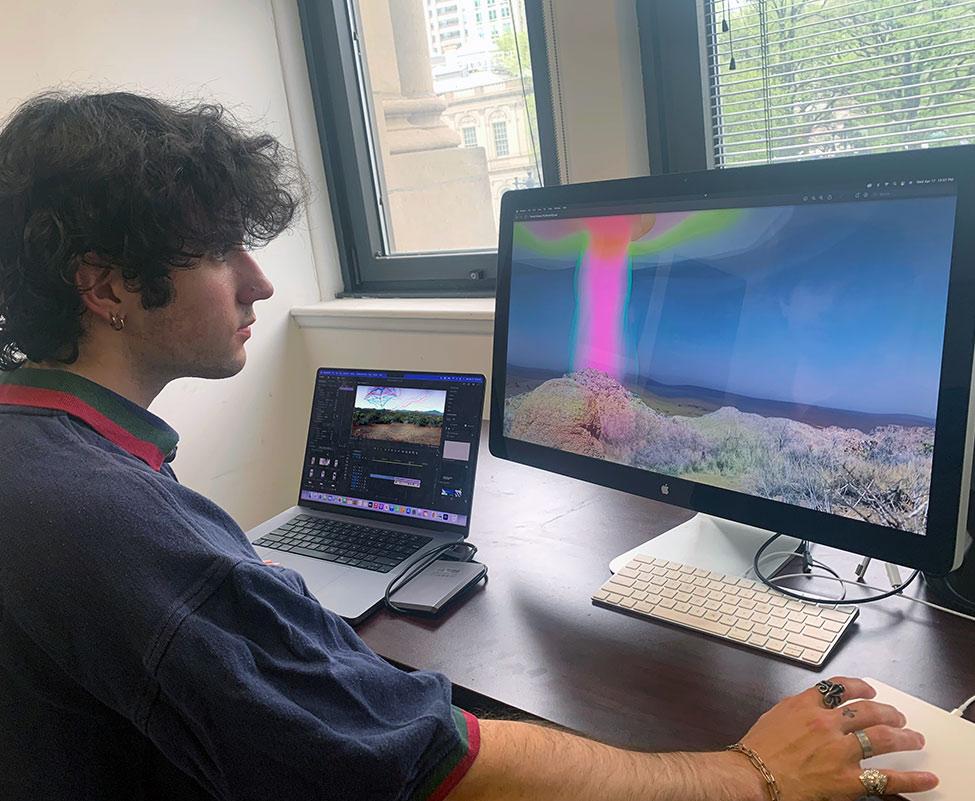
Of his experiences, Pfeifer said, "Professor McDonald's mentorship was truly valuable. She provided very insightful instructions while also allowing me to explore and discover things on my own. Seeing the project projected on the Manhattan Bridge was surreal and a true expression of hard work paying off."
McDonald and Pfeifer also worked on other projects supported by the Amelia A. Gould Assistantship. In Sweet Spot and Soft Spot, a pair of videos featuring McDonald's hand caressing numerous mosses and mushrooms in various landscapes across Scotland, Ontario, New Mexico, New Hampshire, and New York, Pfeifer worked on color correction, sound matching, and adding new scenes while McDonald shot them.
Pfeifer also completed a re-edit of a video McDonald made in the forest as part of a residency at Stony Brook University that she repurposed for a music video of the song, “In the Woods,” by the folk Americana, Winnipeg-based band, Leaf Rapids. In addition, they are working together on Chandeliers!, a project McDonald started years ago but that Pfeifer helped bring to fruition, which features scenes of crashing chandeliers from horror films mixed with tourist videos of calving glaciers from YouTube. Finally, he made a ten-minute version of her newest work, Tunnel and Radio Skies, funded by The Canada Council for the Arts and Pace.
This plethora of projects is welcomed by Pfeifer, who chose Pace as a perfect place to explore countless possibilities, a place where a person with many interests would not be confined to any one box. He said, "I have a real interest in visual pleasure and experience, and I hope to continue working on projects that are meaningful to myself and the audience. I hope to never stop creating."

On the importance of funding artists
Art is where McDonald's energy naturally goes, and so, she is appreciative of support she has received throughout the years during her prolific career, whether in the form of grant funding, such as the Amelia A. Gould Assistantship, or residencies, both crucial resources for an artist who self-describes as someone who doesn't necessarily make art she can sell, therefore operating differently in the art world.
Creation is key. "Everything has potential to be made into art, and making it is a way to communicate and make sense or senselessness of the world."
Dyson Digital Digest: Summer 2024
As the Class of 2024 prepares to cross the stage at the USTA Billie Jean King National Tennis Center, graduating students shared their plans for the future and reflected on their most memorable moments from their time at Pace—from meaningful mentorship from professors to career-altering courses to unforgettable extracurricular experiences.
Associate Professor of History Michelle Chase, PhD, has been selected as a Periclean Faculty Leader by Project Pericles and has received a $4,500 grant from the organization to create a new humanities course that incorporates a community-initiated project.
As program coordinator of the BA in Writing for Diversity and Equity in Theater and Media (W4DETM), Colby Hopkins creates and facilitates social justice and diversity, equity, and inclusion (DEI) programming for students; cultivates partnerships within and outside of Pace; writes grant proposals, reports, and program assessments; and much more.
Sharpening Analytical Skills at an Innovative Internship
Lubin graduate student Cianna Bar '25 is sharpening her analytical skills at her internship at Jaguar Land Rover, a brand with a great work culture and reputation for innovation and excellence.
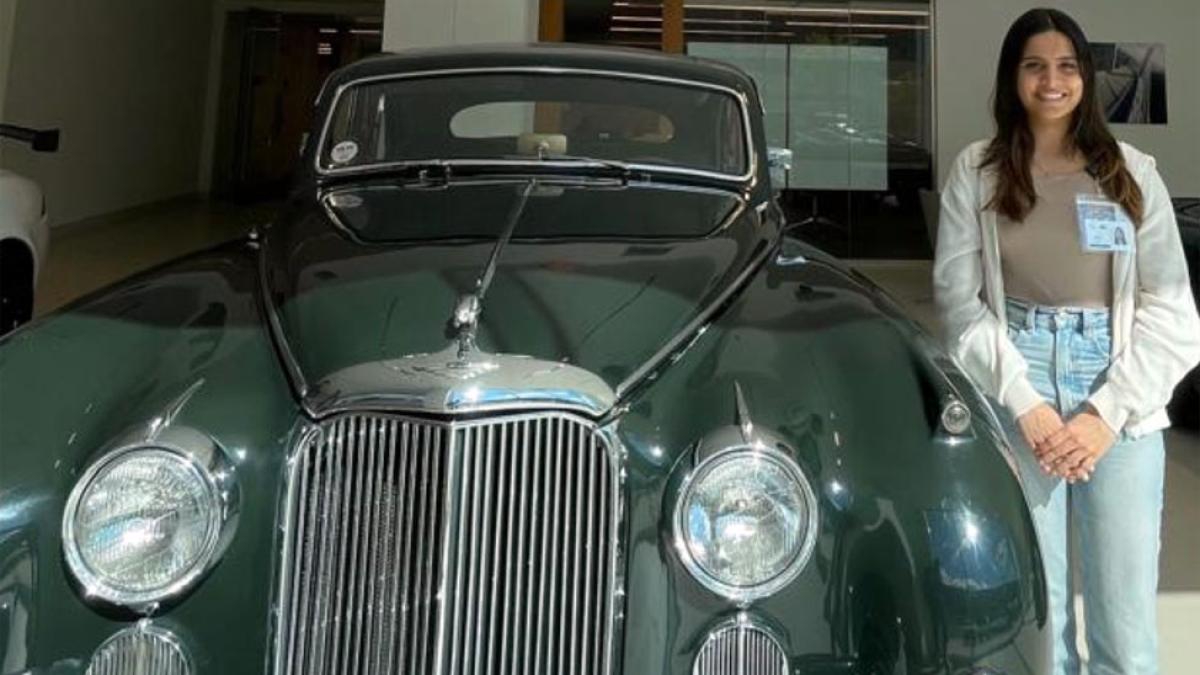
Cianna Bar
Class of 2025
Currently Studying: MS in Social Media and Mobile Marketing
Current Internship: Digital Transformation Intern, Jaguar Land Rover (JLR) North America

Lubin graduate student Cianna Bar '25 is sharpening her analytical skills at her internship at Jaguar Land Rover, a brand with a great work culture and reputation for innovation and excellence.
How has the Lubin School of Business helped you prepare for your current internship?
The support from my professors and Career Services has been invaluable. They have offered guidance and resources that helped me navigate the competitive internship landscape.
What attracted you to this internship?
Jaguar Land Rover has a great work culture and the brand has a reputation for innovation and excellence. I am honored to get this opportunity to work with a global leader and be part of a team that drives industry advancements.
Describe what a typical day looks like as an intern at Jaguar Land Rover?
A typical day as a digital transformation intern at Jaguar Land Rover starts with a team meeting where we discuss ongoing projects and set priorities for the day. Collaboration is a key part of the role, so I frequently work with colleagues on various projects, contributing ideas and solutions. The environment is fast-paced, and there's always something new to learn, whether it's about the latest automotive technologies or emerging market trends.
What has been the highlight or most enjoyable aspect of your internship so far?
The highlight of my internship, so far, has been the opportunity to work on a project that directly impacts the company's strategy. The supportive and collaborative culture at Jaguar Land Rover has also made the experience enjoyable, as I've been able to learn from and be inspired by some of the best professionals in the industry. Here's a shoutout to my amazing managers Liz Willard and Rem Dinio!
How has this experience shaped or impacted your career goals?
My experience working as an analyst on various projects has profoundly shaped my career goals by deepening my understanding of managing projects and the critical role technology plays in reshaping business operations and marketing strategies. As a marketing student, I've seen how digital transformation enhances data-driven insights. This has significantly sharpened my analytical skills and exposed me to industry best practices, broadening my horizons and inspiring me towards pursuing roles promoting innovation and technology.
How will this experience impact your next semester at Lubin?
I feel more confident because this hands-on experience has helped me highlight marketing areas where I can further specialize, which has encouraged me to enroll in elective courses related to this area of expertise.
My advice to other Lubin students is to start early and leverage all the resources available to you. Career Services at Pace University is a fantastic asset, so make sure to utilize their workshops, resume review sessions, and networking events. Be proactive in seeking opportunities, and don't be afraid to reach out to professionals in your desired industry.
Do you have any advice for other Lubin students who would like to pursue an internship in the future?
My advice to other Lubin students is to start early and leverage all the resources available to you. Career Services at Pace University is a fantastic asset, so make sure to utilize their workshops, resume review sessions, and networking events. Be proactive in seeking opportunities, and don't be afraid to reach out to professionals in your desired industry. Lastly, stay open-minded and be ready to learn—internships are as much about discovering what you enjoy, as they are about gaining work experience.
Connect with Cianna:
Projects Powered by ChatGPT
From animal advocacy to marketing strategy, check out how Mike Derasmo ’24 used Chat GPT to expand his understanding of artificial intelligence and find creative solutions for class projects.


The rise of accessible generative artificial intelligence (AI) tools is quickly transforming fields as users find innovative use cases. During his last year at Pace Mike Derasmo ’24, who just graduated with his BBA in Global Marketing Management, decided to explore this new technology and incorporate it into class projects by creating custom chat bots.
OpenAI’s Chat GPT platform has been a frontrunner in the AI conversation, breaking the record for the fastest online platform to reach one million users, achieving the benchmark in under five days. (Compare this to X, which took two years to reach one million!)
Many, like Mike, saw the immense potential of Chat GPT and jumped at the opportunity to explore its capabilities. "Once Chat GPT came out, and I saw how people were using it, I realized this was something that can solve anything, if you set it up correctly,” Mike said. “I immediately saw the opportunities for businesses. I knew that it could help me start my own business and set me apart from others in the job market if I got an early advantage.”
Once Chat GPT came out, and I saw how people were using it, I realized this was something that can solve anything, if you set it up correctly.
Mike first used Chat GPT to help with Pace’s Animal Advocacy Clinic, an experiential course where students directly lobby on issues of animal and wildlife welfare. Mike created a bot that could assist in the research to support these arguments, serving as a fast-paced database for the students as they prepared their lobbying efforts. He used it in particular when the class appealed to New York State Senator Pete Harckham about Senate Bill S9069, which would restrict anticoagulant pesticide in New York, using the bot to review their research and other data to better advocate for the bill.
During the process of building the bot, Mike realized he could find other uses for the bot. He got the chance to test this out in his Digital Marketing class in the spring, when the class had acted as marketing consultants for local small businesses. Mike’s team worked with Twenty Sided Store, a board game store and event space, offering new strategies for their social media presence and website.
I knew that it could help me start my own business and set me apart from others in the job market if I got an early advantage.
Twenty Sided Helper, another custom bot, was Mike’s solution to bolster their marketing. Not only could his team use the bot to get deeper insights into the business for the project, but the tool could potentially even be used by the company going forward. He demonstrated for the class and the business owners how his bot could quickly identify customer engagement across social media platforms, discover product trends based on sales, and more. “You could even have it look at competitors and see what they’re doing and use it to help develop a plan on how to do the same things while retaining your own identity,” explains Mike.
As an early adopter of generative AI, Mike’s advice to other students interested in learning more is to just start using the tools. “Get into it and hit roadblocks,” he says. “Once you solve how to get past those roadblocks, you’ll be ahead of a lot of people in your industry.”
I can apply all the work I’m doing now into the professional world.
Post-graduation, Mike is looking forward to taking these practical applications of AI into his future career. “I want to own my own business one day. I can apply all the work I’m doing now into the professional world,” he says. “I think modern AI programs are amongst the coolest innovations of all time, as they can solve just about anything if you ask it properly.”
More from Pace
How will ChatGPT and the emergence of AI language models change learning and higher education? Our faculty weighs in.
Pace University’s Seidenberg School of Computer Science and Information Systems is launching a new artificial intelligence (AI) lab at its New York City campus.
The lab will be housed in the brand new, cutting-edge building at 15 Beekman, the dedicated home for Seidenberg. It aims to serve as the central hub of AI for the Pace community, offering training and opportunities to learn, grow, and collaborate for students, faculty, and staff
Dyson economics student and Fed Challenge team co-captain Liam Chentoufi ’25, pictured alongside the team and Federal Reserve chair Jerome Powell, is harnessing the power of AI to help better predict Federal Reserve monetary policy decisions through an exploratory research study leveraging machine learning.
Leaving On a Jet Plane: Studying Abroad Through Pace
Why not earn credits for your degree while exploring the world? At Pace, you can take in-depth courses or save open electives for amazing international experiences. Did you know a semester abroad can cost the same—or even less—than a semester at Pace?


Why not earn credits for your degree while exploring the world? At Pace, you can take in-depth courses or save open electives for amazing international experiences. Did you know a semester abroad can cost the same—or even less—than a semester at Pace?
Earn Credits and Have Fun Abroad!
Why not earn credits for your degree while exploring the world? At Pace, you can dive deep into courses in your discipline or save your open electives for an amazing international experience by taking Areas of Knowledge (AOKs) abroad. Whether you're studying abroad for a semester or a whole year, Pace requires a full course load.
Big Savings
Believe it or not, a semester abroad can cost the same—or even less—than a semester at Pace! When you study abroad, you’ll pay Pace tuition and fees, plus housing to an overseas institution (which often costs less than housing at Pace!). All your federal and state financial aid applies, and for some programs, up to 100% of your Pace scholarships and grants apply. Plus, there are plenty of additional scholarships available.
Boost Your Job Prospects
Students who study abroad are more attractive to employers. It enhances intercultural awareness, critical thinking, self-confidence, academic performance, language skills, and professional development. You’ll learn to problem-solve, train for international careers, develop a global outlook, and collaborate with diverse backgrounds—skills that are crucial for today’s graduates. Talk about a resume booster!
Graduate on Time, or Even Earlier
Most Pace students who study abroad graduate on time or even earlier. Nationally, study abroad participants also have higher graduation rates. Plus, students who go abroad tend to have higher GPAs than those who don’t.
Don’t Fear FOMO
Sure, you might miss a few events back home, but you’ll be gaining a world of new adventures. New interests, experiences, and friends from all over the world await you. You’ll grow in ways you never imagined and gain a clearer sense of self. Many college graduates who didn't study abroad say their biggest regret is not going.
Ready to think about studying abroad as a Pace Student? Check out the Study Abroad website and save the dates for upcoming study abroad fairs on both the NYC and Pleasantville campuses.
More from Pace
Computer science student Sachin Archer knows what it’s like to defy expectations. His journey has led him from Jamaica to New York City, and now the world. Take it from him, it’s never too early to dive in: “I'm doing all these amazing things. And I'm only 19.”
Lubin student Richelle Fatalo '25 isn't afraid to step out of her comfort zone. When the opportunity to study abroad arose, Richelle went after it—despite having never set foot in the country that she would soon call home. Not only did she get to visit new cities and see historic landmarks, but she also gained valuable insight into how marketing is done in other countries.
After jumping into an exciting exchange program in Spain, Kelsey Tulley '25 now encourages other Lubin School of Business students to do the same—not only to see the world, but to generate a new mindset. She credits a study abroad scholarship designed exclusively for Lubin students abroad and the knowledge she gained in her business courses for a successful semester in Europe.
Housing 101: First-Time Residents
Moving out for the first time is stressful—for you and your family! Here are a few things you need to know as a first-year residential student moving on to a Pace campus.
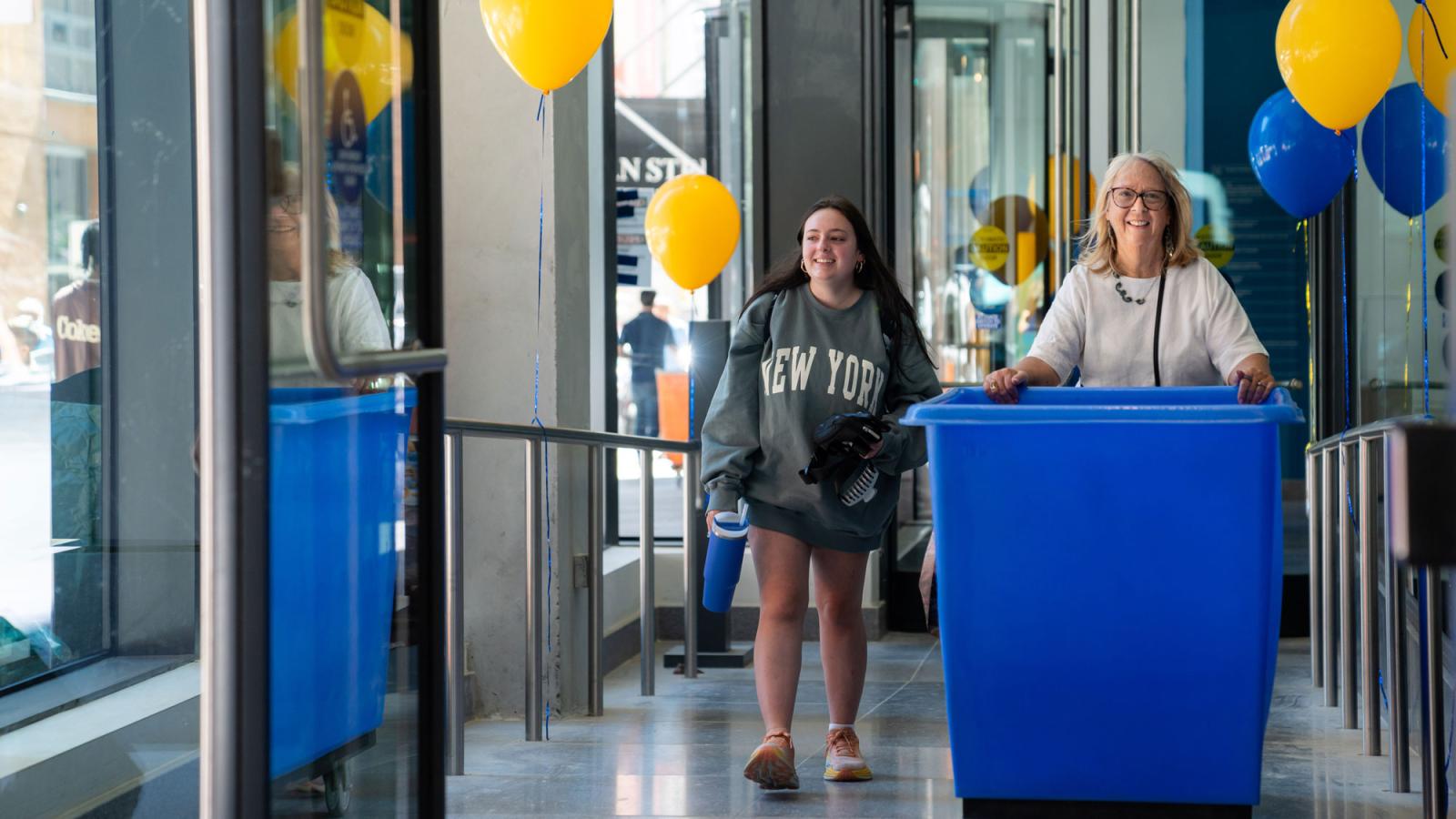
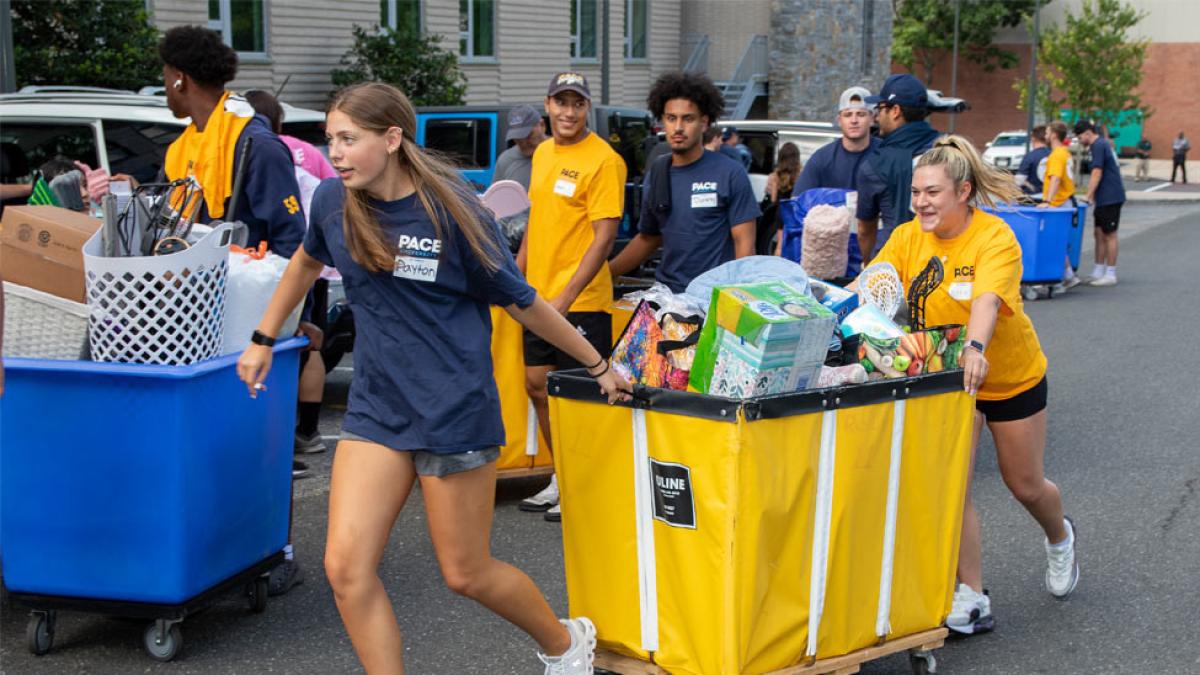
From quads to doubles and from townhouses to private rooms, moving out for the first time is stressful—for you and your family! Here are a few things you need to know as a first-year residential student moving on to a Pace campus.
- What to Bring (And not bring!)
- On-Campus Mailing Addresses
- FAQ for Living in Residence
- Important Resources for Residential Students
- Contacting Residential Life and Housing Operations
And if you still haven’t found the info you were looking for, please refer to our exhaustive Guide to Residential Living (PDF).
What to Bring (And Not Bring!)
One of the great things about having campuses in New York is that we’re close to all sorts of stores—if you’ve forgotten something, if you got something for your space but it doesn’t work as well as you’d hoped, if you thought your roommate was bringing something and they didn’t, it’s okay. There are plenty of stores surrounding all of our campuses and if you don’t have something you need on the first day of the semester, it’s not the end of the world. Plus, during your first few weeks on campus, Student Engagement hosts shopping trips so you can grab any of the last-minute items you didn’t get to bring. On top of that, you can have just about anything shipped to your residence hall relatively quickly. So, let’s get into it:
Do Bring:
- Your brand-new Pace ID. You'll get your Pace ID from Housing staff when you move in. To make sure your ID is ready and waiting for you, submit your ID photos online using the Online Photo ID Submission Webpage.
- Bedding and linens. All of our beds in all of our residence halls use Twin XL sheets.
- Clothing. You don’t need to bring all of your winter-wear at once. New York stays pretty warm until October, so pack a hoodie and a light jacket, but save the winter coats for later in the semester. You won’t need them right away and they’ll take up valuable space. Most of our students do a big wardrobe switch during November break, so plan to bring home your light clothing and return ready for the cooler months. Don’t forget your shower shoes!
- Personal items and toiletries. That’s your body wash, shampoo, shower poufs, razors, cosmetics, toothpaste, face masques, menstrual items, chargers, medication (prescription and OTC), band aids, sunscreen, condoms, emergency cash, tweezers, whatever. Shower caddies are the way to go for keeping all of your bath stuff organized.
- Decorative items. Half the fun of having your new space is decorating it to your personal tastes. We love this! We encourage it. We want you to do it in a way that doesn’t damage our walls or result in a fine at the end of the academic year. That said, be thoughtful about how you are mounting posters, etc. Be careful with the paint in the rooms and make sure you don’t damage anything.
- Functional things. Plan to bring surge protectors (limit 2 per student), ethernet cables (if the wifi is slow, you’ll thank us), hangers for clothes, laundry bags, and headphones. Another item to consider is a foldable rolling cart to help make carrying groceries or larger items easier.
Coordinate with Your Roommates:
- Shower curtains: 78'; best to chat with your roommates before purchasing!
- Televisions: We don't supply standard cable, but if you want to hook up a Fire Stick or Roku to a big screen, you'll need to provide one.
- Cleaning supplies. You are responsible for keeping your space clean. Your suite/room is yours and Pace’s janitorial team does not clean it. Talk to your roommates about who is bringing what to keep it clean—think paper towels, toilet paper, laundry detergent, garbage bags, Swiffer cloths, a lightweight vacuum, all-purpose cleaning fluid, glass cleaner, soap scum sprays. Find what works for you, discuss if you prefer organic versus traditional cleaning supplies and consider assigning tasks to keep your space tidy.
- Lighting. Consider bringing a desk lamp for busy work and one or more for ambient lighting. Remember: no halogen bulbs!
- Food and cooking utensils. We’re talking coffeemakers (with an automatic shut-off), food storage containers, pots and pans, microwave safe plates/bowls, disposable or reusable plates/bowls/cutlery/cups.
- Shovel/snowbrush. This is really for our residents in Westchester bringing a car to campus…while Pace’s Facilities Team handles much of the snow removal on campus (plowing the lots and roads; shoveling and salting the sidewalks and stairs), there may come a time when you just NEED to get to your car. Having a snow shovel may come in handy if you are plowed in (we try our best not to do that, but this is the Northeast). Having a snowbrush will also get your car cleaned off and road ready, so be prepared.
Don’t Bring:
- Things that will catch fire. That means hot plates, air fryers, toasters, grills, space heaters, kerosene lamps, candles, or toaster ovens. We want all of our residents to be safe and that means making sure we don’t have potentially dangerous items in residence.
- Things that will disrupt other residents. No stereo speakers or other amplification devices.
- Furniture. Pace provides all of the furniture you’ll need while living in residence. This furniture includes bedframes and mattresses, desk space, chairs, and storage drawers and/or wardrobe. Some rooms have full closets.
- Bed risers. We know they are tempting to bring to get a little extra under-bed storage, but they can be dangerous when improperly used. The good news is, our beds are adjustable. Fill out a Facilities Request Form (see the resources section below on this page) and someone from our maintenance staff will stop by to raise the bed.
- Micro-fridge: Pace provides a free-standing microwave/mini-fridge unit for suites in all of our residence halls, on all of our campuses. The only exception to this is the Townhouses on our Westchester Campus, which are reserved for upper-level students.
For the full list of items to bring or not bring, please review this packing guide.
On-Campus Mailing Addresses
Students can receive mail and packages on campus at one of our many mailrooms. And just as an FYI, our mailrooms will accept deliveries for students prior to their arrival on campus. Here’s how to address things so you can be sure you’ll get what you need:
New York City Campus
- 15 Beekman:
STUDENT’S NAME
15 Beekman, Rm. XXXX
New York, NY 10038 - 182 Broadway:
STUDENT’S NAME
182 Broadway, Rm. XXXX
New York, NY 10038 - 55 John Street:
STUDENT’S NAME
55 John Street, Rm. XXXX
New York, NY 10038 - 33 Beekman:
STUDENT’S NAME
33 Beekman, Rm. XXXX
New York, NY 10038
Westchester Campus
STUDENT'S NAME
Pace University
99 Castleton Street*
C/O Residence Hall Name (e.g., Alumni Hall, Elm Hall, North Hall), Rm. XXXX
Pleasantville, NY 10570
*That's not a typo. Pace's Mail Services for the Westchester Campus are housed in the town of Pleasantville, NY.
Location of Student Mailrooms
New York City Campus:
- 15 Beekman, 25th Floor, (212) 346-1491
- 33 Beekman Street, Ground Floor, (646) 218-5296
- 182 Broadway, 4th Floor, (646) 218-5413
- 55 John Street, Ground Floor, (646) 218-5296
Westchester Campus:
- Elm Hall, Ground Floor, (914) 773-3865
FAQ For Living in Residence
We know you have a lot of questions, and we want to do our best to get you the info you need. Check out our abridged list of the most asked questions related to living on campus. If you still need more info, check out the full list of FAQ here.
How will housing communicate with me through the summer before I start classes?
Housing communicates to students through their email throughout the summer. We email students at BOTH the personal email address they provided to admissions (through the admissions process) and their Pace University email (which they receive once they are admitted to the University). When completing the housing application, students may (but are not required to) provide an email address for a Parent or Guardian if they would like them copied on the Housing-related emails that we will send during the summer. The identified email will only be sent copies of the standard on-boarding emails sent by the Housing Operations Office, including any reminders we may send, and they will only receive these emails through September 1. After that date, we will no longer copy this alternate address on emails we send the student.
Additionally, a range of important housing information will be available to students through the MyHousing Portal. There, students will find an Arrival Checklist that will help them keep track of the things they need to do prior to move in. This checklist will identify what items are completed, and which have yet to become available for completion.
Where can I get info about the residence halls on Pace’s campuses?
Take a peek at what we offer by visiting the Residence Hall section of our Housing website.
When will I know where I will be placed for housing?
Housing issues final assignments (by email) in early August. The final placement email will include your final building assignment, room type, and room cost. At that time students will be able to see the name(s) of your roommates(s) by logging in to MyHousing.
I’ve been assigned to 15 Beekman in NYC. Can I see pictures or floorplans of my space?
Check out the virtual tours and photos of our newest residence hall, 15 Beekman. Each floor, each room, is a little different and floor plans can vary. As with any college or university housing space, a lot of furniture placement is trial and error. The most common questions we've received about 15 Beekman relate to the dimensions of the bed and the dresser.
- The bed is 80" wide x 36" deep x 36" high. The bed is adjustable. If you need more clearance under the bed, you can put in a Facilities Request ticket and someone from maintenance will help you raise the bed.
- The two-drawer stackable dresser is 24" wide x 24" deep x 20" high.
- The in-suite showers require a shower curtain
- There are no closets in the common space; furniture is provided for personal storage.
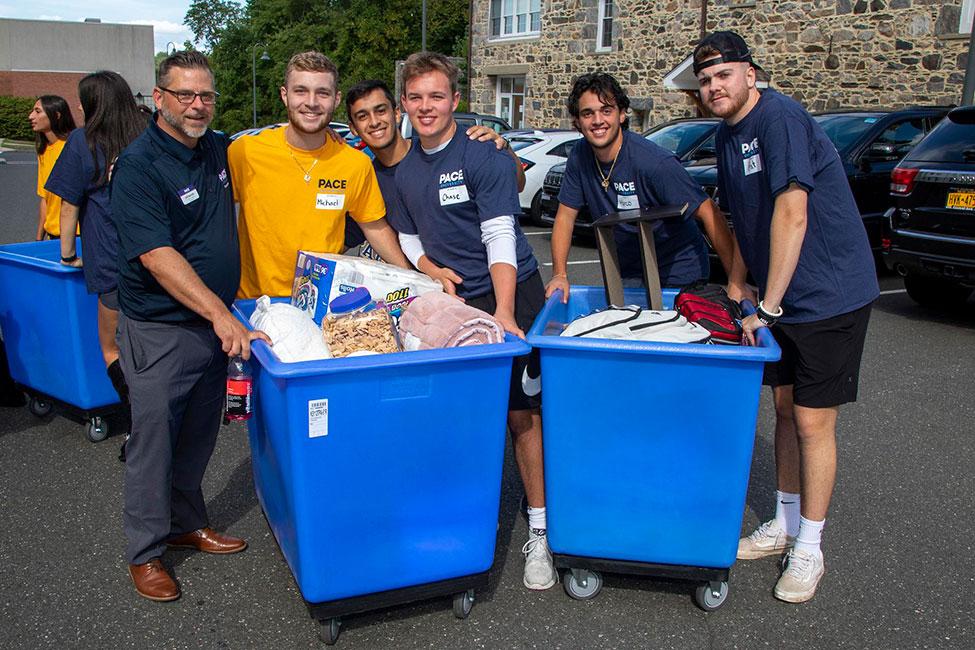
I’ve been placed in a temporary quad room. How long will I be assigned to a temporary or extended occupancy quad?
We cannot say for certain how long students will remain in these kinds of rooms. Our experience demonstrates that we are likely to have many vacancies occur in our first-year student housing within the first several weeks after move-in day. As soon as we confirm a student has cancelled, we begin the process of moving students out of these extended occupancy rooms. And, if you happen to LIKE where you’re living after you move in, you are not required to move out.
Instead of moving in to a temporary or extended occupancy quad, can I just commute from home and see if anything else opens?
This is possible, but we strongly advise students to move in and remain on campus while waiting to be de-quadded. If a temporary or extended occupancy room does not have all residents present (4 in a temp quad), then it will not be prioritized for de-quadding. If you do decide to wait it out at home, you must contact the Housing Operations Staff to make sure that the housing office is aware of your plans, and that your guaranteed space is not offered to another student.
Can I change my room assignment?
Our experience shows that even if a student is unhappy with their original housing assignment, after taking time to adjust to their environment and meet their roommate, floor mates and resident assistant (RA) the vast majority of students no longer wish to move.
I want a single–how do I get one?
There are very few single rooms in Pace housing. Most are selected by upper-level students during the room selection process (the process where our current residents choose their rooms for the following year). First year students and transfers are generally not eligible for single rooms. Students who require a single room due to medical need must complete the medical accommodations application process with Student Accessibility Services to have their accommodation need assessed.
Am I guaranteed to be placed with the person or people I list as preferred roommate(s)?
No, but we will work very hard to place you together. We only grant reciprocal requests, meaning you can only be placed with another person if that person is also guaranteed housing and that person also selected you. For this reason, it is important to communicate with the people with whom you wish to live and ensure that they list you, too.
What do I do if I am interested in All Gender housing?
In keeping with the mission of Pace University to promote and support diversity, the Office of Residential Life offers All Gender Housing options to students who demonstrate an interest in and need for such accommodation. This process seeks to provide a living environment welcoming to all gender identities; one not limited by the traditional gender binary.
When do I move in? Will people be available to assist me?
New students, including first-year, transfer, and graduate students entering Pace for the first time this semester, are asked to select a move-in appointment on the Primary Move-In Days for their campus. These are:
- New York City Campus: Friday, August 30, and Saturday, August 31, 2024
- Westchester Campus: Saturday, August 31, 2024
During the move-in period, teams of Pace staff will be on-hand to help move your belongings to your room. We’ll have big rolling bins to help make the process smooth and efficient.
For information pertaining to returning student move-in, early arrival and/or late arrival, please review the 2024 Residence Hall Move-in Plan.
Is there a curfew in housing, or are there "bed checks"?
No. We do not check on residents each night to ensure that they are in their room, and there is no curfew. College is an adult environment, in which students are expected to manage their own coming and going. While the floor RA and the rest of the housing staff is available to provide assistance and guidance, we do not enforce any kind of curfew, nor do we conduct "bed checks."
I’ve already moved in and there’s an issue with my space. How do I contact maintenance?
Need your bed raised to make space for your giant storage container? Have a leak in your residence hall? Too hot or too cold in your classroom? Facilities is here to help. Make sure you’re connected to Pace’s network to access the Facilities Request Form, otherwise you’ll receive a 404 error.
Do I have to move all of my belongings when I leave for winter break?
No, you may leave your belongings in your room if you are coming back for spring semester! We do advise that you take home any items of value.
Important Resources for Residential Students
- MyHousing Portal: MyHousing allows you to take care of all your room arrangements—application, deposit, room assignment, roommate selection, and more—all online. Take control of your living arrangements and do it when it works for you. Log into the MyHousing Portal using your Pace credentials.
- Facilities Request Form: Report physical issues in your room or suite to Facilities. Make sure you’re connected to Pace’s network to access the Facilities Request Form, otherwise you’ll receive a 404 error.
- Housing Process for New Students: This webpage is the ultimate guide to residential living as a new student at Pace. It lays out what happens when, deadlines, forms, and so much more.
- Guide to Residential Living (PDF): This is a comprehensive list of all-things Housing and Residential life.
Contacting Residential Life and Housing Operations
University Housing Operations and the Offices of Residential Life are separate staffs that work closely together to meet the needs of resident students.
- The Housing Operations team is a single staff that covers both the NYC and Westchester campuses. They primarily focus on student room assignments, including the room selection process for returning students, and the on-boarding and assignments process for new students. Housing Operations also works as a liaison to the campus facilities staff and oversees summer usage of the residence halls.
- There is a Residential Life staff on both the NYC and Westchester campuses. They oversee the residential experience, from move-in through the end of the year. They oversee the Resident Assistant Staff, a team of peer leaders who live in the halls.
There is a one phone number and email address to contact staff members from these offices. When contacting us, please be ready to clarify which campus you are calling for (and which building, if you are currently a resident student).
Phone: (914) 773-3676
Email: housing@pace.edu
More from Pace
Why not earn credits for your degree while exploring the world? At Pace, you can take in-depth courses or save open electives for amazing international experiences. Did you know a semester abroad can cost the same—or even less—than a semester at Pace?
Lubin graduate student Heera Sojan '24, pursuing her MS in Accounting Data Analytics and Technologies, is climbing the ladder of success as an audit intern at her summer internship with the Office of the New York City Comptroller.
Julie Tokar has always had a passion for justice and knew from an early age that she wanted to pursue a career in law. After graduating from college in three years, Julie studied for the LSAT during COVID and decided Haub Law was the place for her.
Climbing the Ladder of Success
Lubin graduate student Heera Sojan '24, pursuing her MS in Accounting Data Analytics and Technologies, is climbing the ladder of success as an audit intern at her summer internship with the Office of the New York City Comptroller.

Heera Sojan
Class of 2024
Currently Studying: MS in Accounting Data Analytics and Technologies
Current Internship: Audit Intern, Office of the New York City Comptroller
Pronouns: She/Her

Heera Sojan '24 is climbing the ladder of success as an audit intern at her summer internship with the Office of the New York City Comptroller. She is a graduate student pursuing her MS in Accounting Data Analytics and Technologies.
Her internship has helped her understand different bureaus such as audit, public affairs, budget, etc., and how they serve the public.
How has the Lubin School of Business helped you prepare for your current internship?
The amazing Career Services office helped in tailoring my resume and allowing me to network with potential employers. Also, learning about governmental audit at Lubin and being able to apply it at work is a huge opportunity.
As an international student in the US, I was inquisitive to know how the government audits different agencies. Getting to work for the government sounded like a great opportunity to learn this.
What attracted you to this internship?
As an international student in the US, I was inquisitive to know how the government audits different agencies. Getting to work for the government sounded like a great opportunity to learn this.
Describe what a typical day looks like as an intern at the Office of the New York City Comptroller.
I work Mondays-Thursdays, 9:00 a.m.–5:00 p.m., in-person. A typical day includes reporting to my supervisor in the morning, discussing my assignments and working on them, and going to a workshop/speaker series from 2:00 p.m.–3:00 p.m.
What has been the highlight or most enjoyable aspect of your internship so far?
The Office of the New York City Comptroller organized a "Meet the Leadership" series, where all the interns meet and pose questions to leaders of different bureaus such as audit, public affairs, budget, etc., to understand how they serve the public. They also talk about the career path they followed.
How has this experience shaped or impacted your career goals?
I am considering working for the government so that I can serve the public.
How will this experience impact your next semester at Lubin?
This experience has helped me gain professional experience, connect with professionals who work in this field, and develop skills that will impact my next semester.
Do you have any advice for other Lubin students who would like to pursue an internship in the future?
Keep applying to every internship/job you can—you never know what incredible opportunity you may land.
Connect with Heera:
